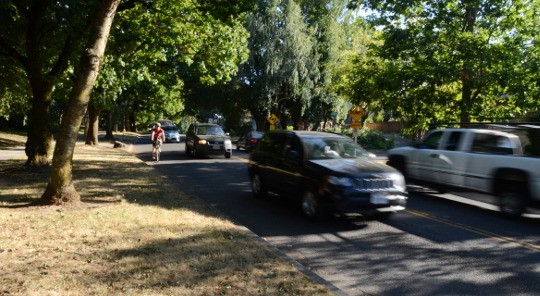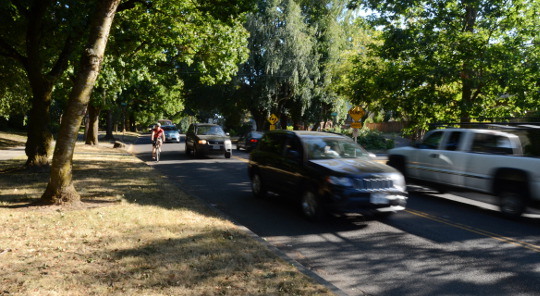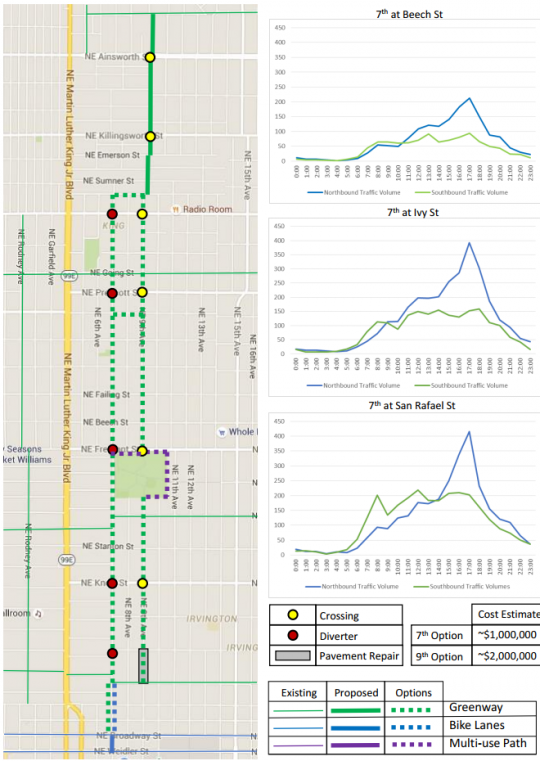
heavily used by cars as an alternative to MLK.
(Photo: M.Andersen/BikePortland)
A roomful of inner Northeast Portland residents gave an “overwhelming” thumbs-up Monday night to a plan to eventually turn Northeast 7th Avenue into a low-traffic neighborhood greenway between Alberta and Broadway.
That’d vastly improve the bike network just west of Alameda Ridge, but require traffic diverters that would send thousands of vehicles a day to other nearby streets, probably Martin Luther King Boulevard and 15th Avenue.
“Pretty much every organization that’s weighed in has stated that 7th is the preferred greenway.”
— Steve Cole, president of Irvington Community Association
That was the summary of Zef Wagner, the city transportation planner who’d called Monday’s meeting at the St Philip the Deacon church.
Wagner asked for the meeting after the Irvington, Eliot and King neighborhood associations all sent letters to the city urging it not to de-designate 7th Avenue as a future bikeway.
If city voters pass a ten-cent gas tax in May, a “7th/9th bikeway” would be planned in the next four years, but the exact route is uncertain. Wagner said that based on early public input, he’d proposed keeping 7th Avenue as a possible bike route south of Skidmore (in addition to 9th) and to use 9th Avenue north of Skidmore. Other PBOT staff agreed and the change was also backed by Commissioner Steve Novick, he said.
But after hearing one resident after another testify Monday that 7th Avenue was far overcrowded with cars and was in any case a much better bike route, Wagner said he might suggest that Novick retain 7th as a possible route north of Skidmore, too.
Thanks in part to a huge spike in northbound traffic during the evening rush hour, 7th Avenue currently carries about 5,500 cars a day, almost twice the city’s target for the “local street” that it technically is. During other hours, residents said, northbound traffic using it as an alternative to Martin Luther King Boulevard (which is three blocks east) often speeds up the street.
“We’ve had people miss the turnabout and drive down our sidewalk like they were still on the street, at 25 mph,” said Brooke Cabatic.
In the last few years, Jereme Grzybowski said, traffic “has grown tremendously, to a crisis level.”
“You get on 7th and you can fly,” he said. “You can go uninterrupted.”
“It’s a throughway,” said Jay Hoover, saying he was uncomfortable just going down his driveway on a bicycle.
“At every single interesection there’s been accidents and there’s children crossing the street,” said Montserrat Shepherd.
“My son is three,” said Nick Fox. “I’ve had people yell the F word at him. I’ve had people slam on their brakes as he crosses 7th. So he ended up stopping riding his bike for a while.”
Fox was one of several attendees who said he would eagerly support one or more traffic diverters on the street.
“I’m really happy to hear you talking about diversion on 7th,” Fox said. “I’d be happy when I drive, which I do most days a week, to go out of my way if it made it safer.”
That prompted a round of applause from many of the three dozen or so people present.
Advertisement
Steve Cole, president of the Irvington Community Association, said he didn’t understand why the city is considering 9th Avenue at all.
“Pretty much every organization that’s weighed in has stated that 7th is the preferred greenway,” Cole said. “If you were to turn 9th into a greenway, you’d still have a problem with traffic and pedestrians on 7th.”
Cole noted that a 7th Avenue greenway project also has the virtue of being much cheaper: about $1 million, compared to $2 million for 9th. That’s mostly because 7th Avenue already has stoplights at major streets.
Many residents were uneasy about which other streets traffic might divert to. But because of the many interruptions and jogs on the nearby street grid, Wagner pointed out, adding traffic diverters to 7th would probably push non-local car traffic west to Martin Luther King Boulevard or east to 15th.
Allan Rudwick pointed out that the city already has a plan in the works to upgrade the signals on MLK Boulevard. Wagner confirmed that this might increase the auto capacity of MLK, offsetting some of the delay caused by diverting several hundred cars from 7th during the evening rush hour.
“Adding several hundred cars to MLK during the pm peak hour would definitely cause problems,” Wagner said. “Are we willing to accept the backlash from people having to take MLK that don’t now?”
Another relevant issue: access to businesses. Wagner said he’d be interested to hear from the businesses around 7th and Knott.
Emily Guise, one of the co-chairs of BikeLoudPDX, also attended the meeting.
“I am really excited about this project,” she said. “Our group fully supports this. We think it would help with congestion, livability and affordability in general.”
Another resident, Andrew Neerman, said he too is enthusiastic about the potential for a 7th Avenue bikeway.
“This is a chance to do something that is really truly platinum and world-class,” he said.
Joseph Albert agreed.
“It’s not 7th vs 8th vs 9th vs MLK — we just have too many cars,” Albert said. “Making the corridor be an effective bicycle commuting corridor is going to reduce the number of cars.”
That comment led to applause, too.
— Michael Andersen, (503) 333-7824 – michael@bikeportland.org
BikePortland can’t survive without subscribers. It’s just $10 per month and you can sign up in a few minutes.



